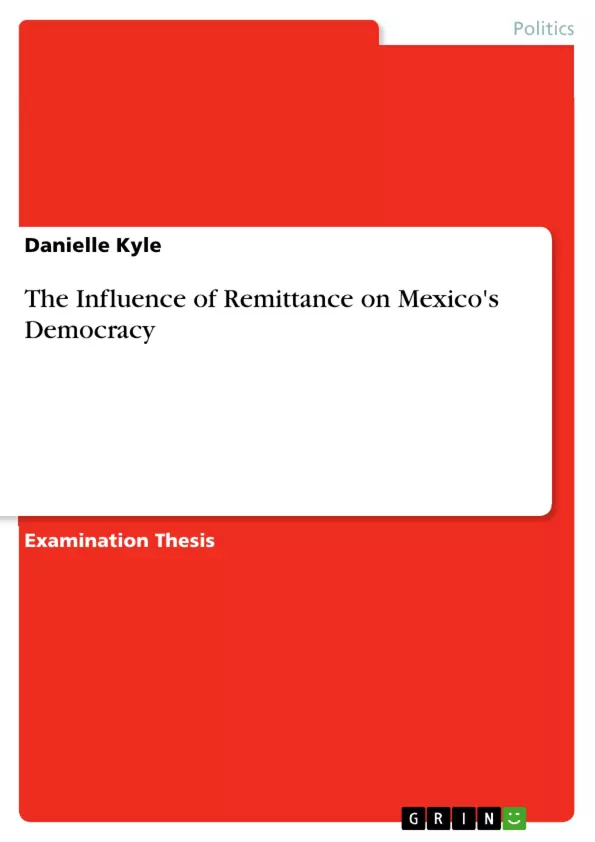This work provides an in-depth look at the way remittance effects democratization in Mexico.
As globalisation continues to increase and new technologies make communication over long distances more accessible, it should come as no surprise that migrants play a role in shaping their home country's politics. As a new democracy, and the home country of many migrants, Mexico provides a fascinating landscape to research these developments. According to the World Bank, approximately 2% of Mexico's GDP comes from financial remittances. How do remittances shape Mexican politics?
Remittance is often spoken of in terms of finances - even Webster defines remittance as "a transmittal of money (as to a distant place)". Even so, it is important to consider the effect of social remittances as well, which is "the exchange" (or transmittal, as Webster likes to say) "of ideas, skills, practices and know-how". The political process is shaped by more than economy and finances, and although both play an important role, it is necessary to consider the social aspects that contribute to policy and democratization as well.
While much research has been done on the economic and social effects of remittances, there is a clear gap in studies on the political consequences. Economics and social values form political issues and movements, so it is important to understand how remittances contribute to politics as well. With anti-immigration sentiments playing a large role in recent political movements, there has been a focus on the effects of immigration in receiving countries, as opposed to sending countries.
Social remittance through family members living in countries with more developed democracies can make individuals more critical of their own country's politics. Financial remittance can make individuals less reliant on patronage systems). Based on this information, I hypothesize that remittance helps promote democratization in Mexico through increased political engagement, holding institutions accountable and encouraging competitive elections.
Inhaltsverzeichnis (Table of Contents)
- Introduction
- Literature Review
- Theory
- Research Design and Methodology
- Conclusions
- Bibliography
Zielsetzung und Themenschwerpunkte (Objectives and Key Themes)
This research aims to analyze the impact of remittances on democratization in Mexico, exploring both financial and social remittances. The study investigates how remittances influence political engagement, accountability of institutions, and competitive elections in Mexico, aiming to contribute to the understanding of the political consequences of remittances in sending countries.
- The role of remittances in shaping Mexican politics
- The impact of social remittances on political awareness and engagement
- The influence of financial remittances on patronage systems and political accountability
- The potential of remittances to promote democratic processes in Mexico
- The relationship between remittances and anti-immigration sentiment in receiving countries
Zusammenfassung der Kapitel (Chapter Summaries)
- Introduction: This chapter sets the stage for the research, exploring the increasing role of migrants in shaping their home countries' politics. It highlights Mexico's unique position as a new democracy with a large diaspora and introduces the concept of both financial and social remittances. The chapter emphasizes the need to study the political consequences of remittances beyond their economic and social effects.
- Literature Review: This chapter reviews existing research on the impact of remittances in Mexico, focusing on recent studies and highlighting the limited literature from a political science perspective. It examines various perspectives on remittances, including their effects on democratization, corruption, and political engagement. The chapter also analyzes the role of migrants in shaping their home country's politics and the potential of collective remittance organizations to promote development.
Schlüsselwörter (Keywords)
The primary keywords and focus topics include remittances, democratization, Mexico, political engagement, accountability, patronage systems, social remittances, financial remittances, anti-immigration sentiment, and migrant politics.
Frequently Asked Questions
What is the difference between financial and social remittances?
Financial remittances are money transfers sent by migrants to their home country. Social remittances refer to the exchange of ideas, skills, and democratic practices learned abroad.
How do remittances influence democratization in Mexico?
Remittances can promote democracy by increasing political engagement, making individuals less reliant on local patronage systems, and encouraging more competitive elections.
What percentage of Mexico's GDP comes from remittances?
According to the World Bank data cited in the paper, approximately 2% of Mexico's GDP is derived from financial remittances.
How do social remittances affect political awareness?
Migrants living in more developed democracies often share values with family members in Mexico, making them more critical of their own political institutions and corruption.
What role do collective remittance organizations play?
The research examines how groups of migrants pool resources to promote development and accountability in their home communities, bypassing traditional government channels.
Why is there a gap in research regarding political remittances?
Most studies focus on economic and social effects; however, this paper argues that the political consequences for sending countries are equally significant and understudied.
- Citation du texte
- Danielle Kyle (Auteur), 2017, The Influence of Remittance on Mexico's Democracy, Munich, GRIN Verlag, https://www.grin.com/document/489359



